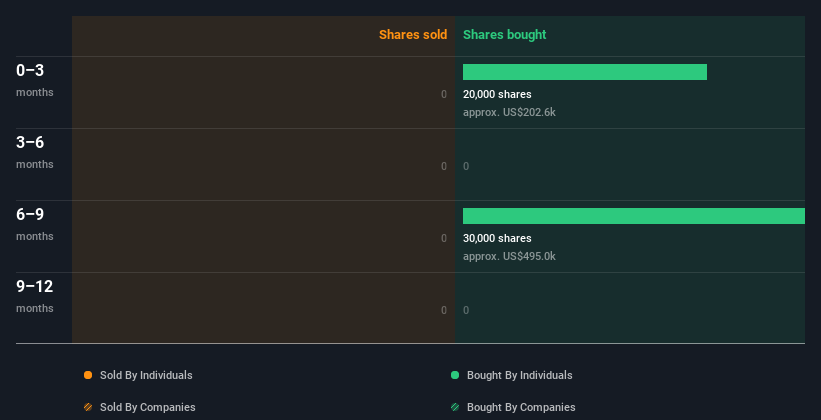John Nackel Is The Independent Director of The Pennant Group, Inc. (NASDAQ:PNTG) And They Just Picked Up 31% More Shares
Potential The Pennant Group, Inc. (NASDAQ:PNTG) shareholders may wish to note that the Independent Director, John Nackel, recently bought US$203k worth of stock, paying US$10.13 for each share. That's a very decent purchase to our minds and it grew their holding by a solid 31%.
See our latest analysis for Pennant Group
Pennant Group Insider Transactions Over The Last Year
The Non-Independent Director Christopher Christensen made the biggest insider purchase in the last 12 months. That single transaction was for US$451k worth of shares at a price of US$16.50 each. So it's clear an insider wanted to buy, even at a higher price than the current share price (being US$10.59). While their view may have changed since the purchase was made, this does at least suggest they have had confidence in the company's future. To us, it's very important to consider the price insiders pay for shares. As a general rule, we feel more positive about a stock if insiders have bought shares at above current prices, because that suggests they viewed the stock as good value, even at a higher price.
While Pennant Group insiders bought shares during the last year, they didn't sell. The average buy price was around US$13.95. This is nice to see since it implies that insiders might see value around current prices. You can see the insider transactions (by companies and individuals) over the last year depicted in the chart below. By clicking on the graph below, you can see the precise details of each insider transaction!
There are plenty of other companies that have insiders buying up shares. You probably do not want to miss this free list of growing companies that insiders are buying.
Insider Ownership
Looking at the total insider shareholdings in a company can help to inform your view of whether they are well aligned with common shareholders. Usually, the higher the insider ownership, the more likely it is that insiders will be incentivised to build the company for the long term. It appears that Pennant Group insiders own 5.1% of the company, worth about US$16m. While this is a strong but not outstanding level of insider ownership, it's enough to indicate some alignment between management and smaller shareholders.
What Might The Insider Transactions At Pennant Group Tell Us?
The recent insider purchase is heartening. And the longer term insider transactions also give us confidence. When combined with notable insider ownership, these factors suggest Pennant Group insiders are well aligned, and that they may think the share price is too low. So these insider transactions can help us build a thesis about the stock, but it's also worthwhile knowing the risks facing this company. Case in point: We've spotted 4 warning signs for Pennant Group you should be aware of, and 1 of these is potentially serious.
Of course, you might find a fantastic investment by looking elsewhere. So take a peek at this free list of interesting companies.
For the purposes of this article, insiders are those individuals who report their transactions to the relevant regulatory body. We currently account for open market transactions and private dispositions, but not derivative transactions.
Have feedback on this article? Concerned about the content? Get in touch with us directly. Alternatively, email editorial-team (at) simplywallst.com.
This article by Simply Wall St is general in nature. We provide commentary based on historical data and analyst forecasts only using an unbiased methodology and our articles are not intended to be financial advice. It does not constitute a recommendation to buy or sell any stock, and does not take account of your objectives, or your financial situation. We aim to bring you long-term focused analysis driven by fundamental data. Note that our analysis may not factor in the latest price-sensitive company announcements or qualitative material. Simply Wall St has no position in any stocks mentioned.
Join A Paid User Research Session
You’ll receive a US$30 Amazon Gift card for 1 hour of your time while helping us build better investing tools for the individual investors like yourself. Sign up here

 Yahoo Finance
Yahoo Finance 
